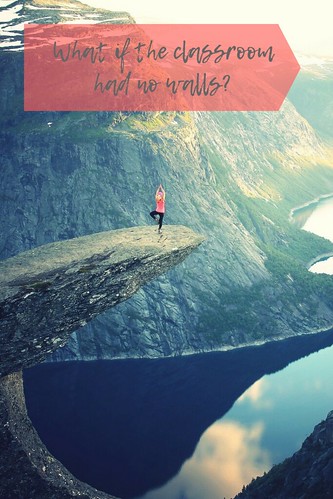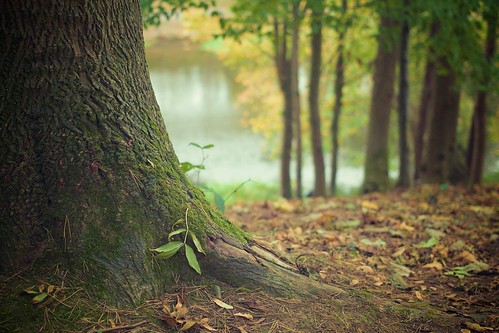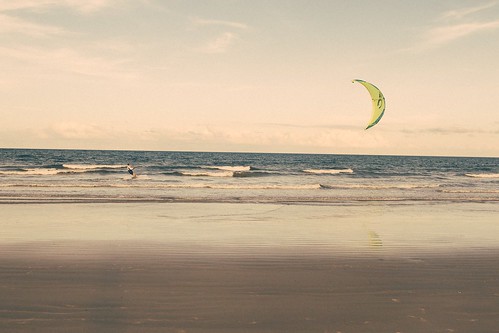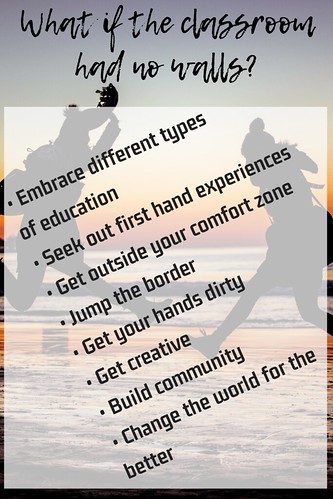It’s officially summer in the northern hemisphere. Days of beach frolicking, no alarm clocks, park picnics, and RV tours are met with nights spent following the trail of fireflies, roasting that perfect marshmallow, and watching nature’s evening show as the sun meets the horizon.
These are the cherished days of summer where traditional schooling is flung by the wayside and finding fun reigns supreme.
If only we could bottle that energy, that joy, that mindful magic complete with youthful sticky fingers, the excitement of toddlers with pockets filled of newfound tadpole friends, and the joy of teenagers who ditch the borders and head for travel journeys across the pond. That elixir would be one for the shelves of Harry Potter’s famed potions master.
What if the classroom had no walls?

What if we built our education around the idea that classrooms never have to have walls?
How would the education of our youth shift if the boundaries were never there in the first place? How would the world change if, from day one, kids felt the joy of those summer nights while in the middle of their learning days? How would the view of ‘learning’ change from the ‘I have to’ conversation to the ‘I want to’ one?
In one way or another, we’ve all gotten an education. Sure, some have gone the traditional route and sat in classrooms of all kinds, while others have grabbed the digital world by its keyboard and let the internet open up a world of possibilities. Some have been able to run wild and free, read books of their own choosing, and develop their focus around things of which they’re interested; others have had their families, state, or area choose their curriculum for them. And still many have (and continue to) faced unyielding obstacles, policies, struggle, danger, and impossible odds - yet learned something about life through it all.
What if we opened the floodgates and allowed all the education in?
What if we truly embraced the ideas of education everywhere and anywhere and allowed our learners to show us their own best way - would it change the next generation? Would it change how we learn, from whom we learn, and from where? Is it a question only designed to ponder, or one to actually pose to your learners?
How would shifting the focus change the game?

Merging those educational philosophies
I grew up in a traditional learning setting. My parents read to me, I went to nursery school and half-day kindergarten, then straight on from grade 1 through 12, and then a 4-year university, master's degree, and even further classes. In between, there were review classes, SAT prep classes, and for those harder to crack classes, tutoring. When school let out in the summer, it was on to my summer home where that most significant, informal education took place - summer camp. Perhaps I didn’t realize then the privilege that came attached to all of this and how with the shift of even one thing, life as I knew it would be inexplicably different.
It wasn’t until a few days after university graduation (when I set off with two friends to backpack through Europe) that I realized something changed. A few years before, I had gone on a group trip to Israel and between that sophomore year trip and the one that senior summer, I got bit by the travel bug and was never the same. Years later, after working at summer camps, youth programs, and child development courses, I got a high school teaching job and never looked back.
Yet somehow in the 20 plus years since that fateful trip to the Middle East, my idea of learning and teaching has shifted to look like something far closer to one that eliminates walls, rather than focusing on those that restrain us.
Forest schools break the mold - let’s get in on the game!
Today, my views on education include varied avenues above and beyond the traditional. My education was wonderful and I am so very grateful to those who gave me every opportunity I had.
In 2018, I think there’s room for growth, change, and the influx of different.
I believe today there’s more room and a greater need than ever before. Today, the news cycle never sleeps, details are hurled at our heads at all hours of the day, and current events seem to loom larger than ever before. Today, there are traditional protests and marches and new school digital boycotts and ‘Gofundme’ campaigns. Today, we can reach across the world to lift someone up, watch zoo animal births through live stream media and teleconference lectures from around the globe…all from the comfort of our own computers. Today, there are constant world struggles and strife, detrimental decisions, and those vehemently afraid of different. Today, there are families sharing the joys of travel and looking to worldschool their children for a period of time - or a lifetime. They’re looking for local educational circles wherever they are, remote access to curriculums and lessons, and to enrich their families through cultural immersion and the infusion of different. Today, there are those who take their education to the road and work remotely while encouraging their young learners to interact with others, learn from varied communities, and find ways to enrich their school curriculum texts from wherever it is they land. Today, there are children interested in opportunities of tomorrow that didn’t exist yesterday.
There are those without the resources I was privileged to have and far more than that, while there’s still a cavernous divide of those who don’t, are forced to be without, or have obstacles blocking the way.
Regardless of privilege or struggle, there are those who at early ages have a strong pull or dream of a better or different life that might involve space travel, international diplomacy, creating their own organization to better the planet, exploring the arts, joining a profession, starting a school, opening their own business, coding as the next big idea, or something we’ve yet to discover.

Yesterday, today, and tomorrow
Today, there’s remote work and remote learning. There’s a growing cadre of digital nomads and those who take part in the sharing economy. There are schools and learners of all sizes and styles - how do we embrace that? There’s coding and STEM work and digital details of all kinds available to us at the tap of a keyboard. Information flows frequently through screens of all types - the world is literally at our fingertips.
If we don’t embrace the new, different, and changing in the world and in education, we fall behind. If people have the capacity to learn, to change, to grow, then so do our educational parameters.
Let’s find ways to seek the varied levels of learning for our varied levels of learners
Merge the student designed ideas of unschooling with the cultural immersion of worldschooling and the Internet capabilities of self-study, and somehow we’ll find a method of new. Let’s take the awesome from the traditional, and synthesize our new understandings of a global community with the old school tenets of multiple intelligences and diverse needs and figure it out for ourselves. Learning circles are helpful. Mentoring programs are successful. Digital learning is boundary breaking, and firsthand experiences are priceless.
It’s summer in the northern hemisphere. Let’s show our youth the endless possibilities and give them the power, the opportunity, and the tools to embrace their own education.
Let’s use our voices, our minds, and our abilities for good and bring the excitement of summer pool days back to the global classroom - whether uncomfortable or not, it is less stifling than those cramped desks, bland hallways, and restrictive policies.
Malala Yousafzai is right: ‘one child, one teacher, one book, one pen can change the world’.
Let’s give our kids the access - and the freedom - to do so. If the world was your classroom, what questions would you ask? Where would you go, who would you seek out, what book would you read, what direction would you take? Wouldn’t it be exciting to find out?

How you can break out of that classroom mold:
Embrace different types of education
• Look for curriculum outside of the textbook
• Hit the digital
• Find online learning communities
• Join mentoring groups
• Go on international retreats
Seek out first hand experiences
• Learn from others
• Find local circles of wisdom
• Audit courses
• Interview authors
• Look for human libraries near you
Get outside your comfort zone
• Take a survival course
• Learn to drive a tractor, sail, fly, play tennis, ride horses, climb, take up golf, pick strawberries - something different to your normal everyday
• Go to a place of religious observance different from your own - listen and be respectful
• Talk to people whose views are different from yours and your family members
• Do something that scares you then meditate and write a reflection of it
Jump the border
• In the figurative sense - spend a day in a community different than yours - and really listen
• In the literal sense - use your passport and visit somewhere completely different - learn from the people, the culture, the education
• Learn a new language - practice it!
• Read books on and from other cultures (including children’s stories and recipe books)
• Travel - it teaches more than imaginable
Get your hands dirty
• Go outside
• Work on a farm for a day
• Take a hands-on lesson from a mechanic (cars, boats, planes, trains, busses)
• Hike, geocache, intern at the zoo
• Help build a house
Get creative
• Take an art/dance class
• Learn to write poetry
• Share your feelings with others
• Move in some way everyday
• Listen to music from other places - write some yourself
Build community
• Join a local group (running, religious, volunteer, organization, learning group)
• Go to a march/rally/meeting/gathering
• Be a part of online forums, digital gatherings
• Take a course, find your tribe, talk to others
• Spend time with people, visit the elderly, read to children, walk shelter animals
Change the world for the better
• Volunteer
• Become a mentor/Big Brother/Big Sister
• Help a family out of a difficult situation
• Build something that helps a community
• Get involved - say yes more! Learn empathy and perspective

Stacey Ebert, our Educational Travels Editor, is a traveler at heart who met her Australian-born husband while on a trip in New Zealand. Stacey was an extracurricular advisor and taught history in a Long Island public high school for over fifteen years, enjoying both the formal and informal educational practices. After a one year 'round the world honeymoon, travel and its many gifts changed her perspective. She has since left the educational world to focus on writing and travel. She is energetic and enthusiastic about long term travel, finding what makes you happy and making the leap. In her spare time she is an event planner, yogi, dark chocolate lover, and spends as much time as possible with her toes in the sand.
Check out her website at thegiftoftravel.wordpress.com for more of her travel musings.
